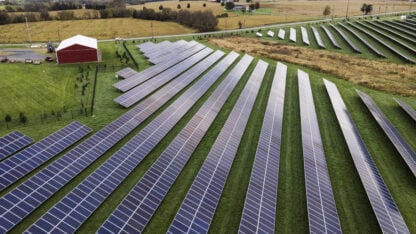Southern Company spent millions on misinformation despite climate change warnings, report finds

A new report from a watchdog group claims the Southern Company knew about the link between emissions and climate change decades ago but still spent tens of millions of dollars on climate misinformation. (AP Photo/Branden Camp, File)
This coverage is made possible through a partnership with WABE and Grist, a nonprofit, independent media organization dedicated to telling stories of climate solutions and a just future.
Southern Company, the parent of Georgia Power, knew about the link between emissions and climate change decades ago but still spent tens of millions of dollars on climate misinformation. That’s according to a new report by the Energy and Policy Institute, a watchdog group looking at the fossil fuel and utility industries.
The report found that top Southern Company officials were privy to early warnings about climate change as far back as the 1960s. The company and its subsidiaries, including Georgia Power, contributed to research into the link between carbon dioxide emissions and climate change in the 1970s and 80s.
But looking at the company’s filings with the Securities and Exchange Commission, EPI found that Southern Company also paid more than $62 million to groups that campaigned against climate science and policies from 1993 to 2005.
“A significant portion of our elected officials in Washington, and even of the US population, still thinks that climate change caused primarily by human activities isn’t a real thing,” said report author Dave Anderson. “And that’s largely due to the seeds of doubt that were planted by Southern Company and others during the late 80s and early 90s, and early 2000s.”
Scientists agree that humans are causing climate change.
In response to the report, Southern Company issued a statement touting its reductions in greenhouse gas emissions in the last 15 years and said it’s committed to reaching net zero emissions by 2050.
What Southern Company knew and did
The new report quotes Southern Company’s statements to shareholders in 2016 and 2017, touting the utility as a leader in technology to reduce carbon dioxide emissions and saying the company “has committed substantial financial and human resources to these efforts since the 1960s.”
The EPI analysis found top Southern Company officials were on distribution lists for reports that linked carbon dioxide emissions to climate change as early as 1964.
“It’s clear that Southern Company was in the room as the utility industry started to pick up its own research into this issue in the 1970s,” Anderson said.
The company was involved in founding the Electric Power Research Institute, which conducted climate change research in the 1970s and 1980s. Georgia Power and another subsidiary, Alabama Power, also contributed to a 1971 report that outlined the industry’s research and development priorities, which included research into the climate effects of power plant emissions, EPI found.
Those earlier research efforts focused on gathering more information about climate change and the links to emissions, Anderson said. But the emphasis began to shift as emissions and climate change became a public policy issue.
“Southern Company and other utilities responded much in the way that ExxonMobil and other companies in the fossil fuel industry did,” he said, “which was by backing special interest groups and outside firms that were engaged in campaigns against climate science and climate policies that included heavy dosages of disinformation.”
EPI’s analysis of SEC filings found that Southern Company spent nearly $32 million with firms that have fought clean air regulation and more than $30 million on special interest groups involved in climate disinformation.
Leaning on carbon capture
Many major utilities were similarly privy to early climate change research, as EPI reported in 2017. But Southern Company stands out because of its research efforts on carbon capture technology.
“Southern Company partly responded to the growing calls for clean air legislation and environmental protections by creating its own research outfit, and then positioning itself to capitalize on a lot of the federal [research and development] funding that was being offered,” Anderson said.
The EPI report points to research from the mid-1980s about carbon capture technology, which aims to prevent carbon dioxide generated by burning fuel from entering the atmosphere.
“Control of emissions by the collection of gas from the stack is not a solution to the global build-up of carbon dioxide in the atmosphere,” a 1985 paper concluded.
The paper was presented at a conference session co-chaired by a Southern Company official, according to the EPI report.
But more than two decades later, Southern Company and another of its subsidiaries, Mississippi Power, banked on carbon capture at a coal plant in Kemper, Mississippi, funded in part by a federal Department of Energy grant. The company promised that new technology would capture 65 percent of the plant’s carbon dioxide emissions.
It didn’t work, and the plant was demolished in 2021.
The company’s response
Southern Company spokesperson Schuyler Baehman said in an email that the company has reduced greenhouse gas emissions by “nearly 50% relative to 2007 levels” and has proposed reducing coal units by 88% by 2028.
In Georgia, Southern Company subsidiary Georgia Power has proposed substantial reductions to its coal use in the long-range plan currently before utility regulators. But in addition to more renewable energy like solar, the company still proposes to use gas, which generates greenhouse gas emissions.
Baehman did not address the company’s early knowledge of climate change or involvement with groups that sowed doubt about climate change.
Regarding advocacy work, Baehman said the company engages with regulators and lawmakers “in the interest of our customers and shareholders” and supports groups and research that “are paving the way for cutting-edge, carbon-free technologies.”
An earlier report by U.K. think tank InfluenceMap found that most of Southern Company’s engagement with public policy on climate change opposed action on climate change and aimed to slow the transition to clean energy.
Baehman also shared with WABE a report by the Campaign for Accountability scrutinizing the Energy and Policy Institute, the author of the latest findings on Southern Company’s past knowledge and action on climate change. The report notes that EPI is not a nonprofit and does not explicitly enumerate its funders.
According to the group’s website, it is “funded by contributions from charitable foundations that support climate action and environmental conservation. [EPI does] not receive funding from corporations, trade associations or governments.”








